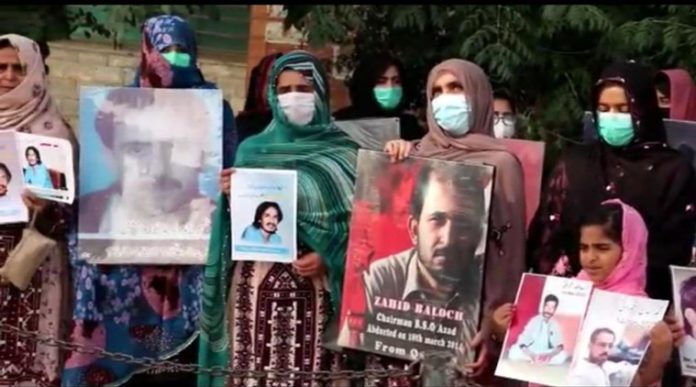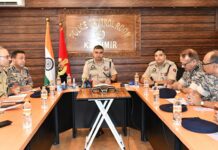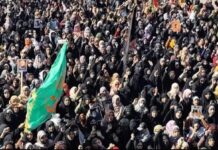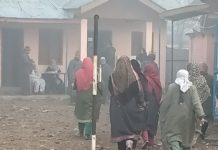New Delhi (NVI): Almost every household in Balochistan lives in fear of their men being abducted, says Haseeba Qambrani, who hails from this province of Pakistan which has been facing oppression at the hands of state authorities.
Haseeba was one of the thousands of people from Balochistan who held a protest in Quetta against enforced disappearances and killings by Pakistan state-supported gangs.
One of her brothers was killed after abduction, while two other brothers are still missing after ‘disappearing’ in February. Disappearance is a euphemism for abductions carried out by the Pakistani intelligence people and the gangs supported by them.
Many a time the kidnapped people are found in deformed state, sometimes even years after their abduction. Some are not even that lucky as their loved ones are never found. The people keep pleading with the government to help recover their sons, brothers, husbands and friends but without any success.
“We don’t celebrate anything. We just mourn…. My grief is there for all to see,” Haseeba wept as she participated in the protest and spoke to Voicepk.net.
Haseeba spoke about how her family first found the deformed body of one of her brothers before two more brothers Hizbullah and Hassan Qambrani disappeared on February 14.
She said the youth of Balochistan have ended up becoming targets of a witch hunt.
Zakir Baloch is another youth who went missing 11 years and his mother and sister continue to make tireless efforts to find him. They not only marched across Pakistan but also took the case up to the Supreme Court of Pakistan and the National Commission for Missing Persons along with the cases of other missing persons from Balochistan.
“Today we have all gathered with the families of missing persons including that of Zakir Majeed Baloch, the Vice Chairman of the Baloch Students Organization, who was abducted from Parangabad, Mastung,” said Mahrang Baloch, whose father Abdul Ghaffar was also abducted and later killed.
Mahrang according to Voicepk.net, said that apart from the Interior Minister of that time, then President of Pakistan, Asif Ali Zardari had also assured them of Zakir’s recovery and had said that enforced disappearances were against the Constitution of Pakistan.
“Zakir Baloch’s mother still cries everyday and we don’t understand where to go and what to do anymore. My mother cries too…as for father he has stopped saying anything. But I protest and I not just Haseeba anymore, I am Farzana, I am Mahrang, I am Bramsh and I am Balochistan. Our brothers are either made addicts or abducted,” Haseeba said.
Prominent Baloch leader Nasrullah Baloch said if any missing person had committed a crime, they should be produced before courts and tried there but they should be released immediately if they are not guilty.
“The issue should be resolved according to the law and if anyone has died in custody then their families must be informed now,” said Baloch.
According to Amnesty International, enforced disappearances have been taking place for a long time and despite the pledges of successive governments to criminalize the practice, there has been slow movement on legislation while people continue to be forcibly picked up and made to disappear with impunity.
The Amnesty International says the “Commission of Inquiry on Enforced Disappearances (COIED) has more than 2,178 cases unresolved as of now. As per the Commission’s recent monthly report, 48 cases disposed of in the month of January 2019, included 46 traced persons out of which 29 were returned home, 10 were traced to internment centers, five are in jails on terrorism charges and two were described as “dead bodies”.
The UN Working Group on Enforced or Involuntary Disappearance has more than 700 cases pending from Pakistan. The number of cases of victims of enforced disappearance recorded by victim groups is much higher.








